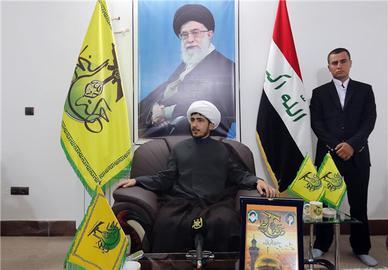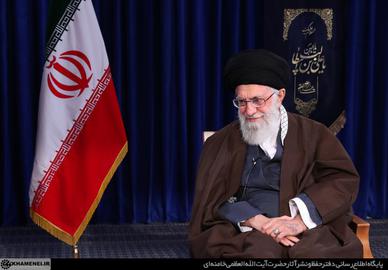A Shia jihadist group loyal to Supreme Leader Ayatollah Khamenei is building considerable influence in Iran’s proxy wars in Syria and Iraq, strengthening Shia power in the region.
Harakat Hezbollah al-Nujaba, or al-Nujaba for short, has an estimated 10,000-strong force operational across several brigades in Iraq and Syria, and in recent months has warned American troops not to attack Shia groups in the region. In the five years since al-Nujaba brigades arrived in Syria, they have played an instrumental role in securing a military advantage for President Bashar al-Asad. And with parliamentary elections in Iraq coming up in May, candidates with ties to al-Nujaba may secure the group even greater power in Iraq if they are elected.
Other groups also loyal to the Iranian leader, including the group Asa’ib ahl al-Haq, are also active in the region, giving further support to Iran’s interests in Iraq and Syria.
So what is behind the establishment of al-Nujaba, and how did it become so powerful?
New Shia Brigades in Iraq
In 2014, a large number of Iraqi militias, mostly Shia Muslims, joined together to create Al-Hashd Al-Sha'abi, or the Popular Mobilization Forces (PMF). Of these groups, the Badr Army, the Iraqi Hezbollah, Asa’ib ahl al-Haq (the “League of Righteous People”) and Harakat Hezbollah al-Nujaba (the “Movement of the Party of God's Nobles”) were the closest to Iran’s expeditionary Qods Force, and were under the command of General Ghasem Soleimani.
After the battle for the holy Iraqi city of Najaf in 2004, the Mahdi Army — followers of the influential Shia cleric Muqtada al-Sadr — reached a ceasefire with the United States and the Iraqi government. But a group of Shia militias led by Qais al-Khazali and Akram al-Kaabi disregarded al-Sadr’s orders and continued the fight. In November 2008, following the disbanding of the Mahdi Army, Sadr established Yom al-Mo’ud (“The Promised Day”) Brigade and invited other militias to join the new group, but al-Khazali and his forces refused to join. With the disbandment of the Mahdi Army, al-Khazali and al-Kaabi went their own way and formally established Asa’ib ahl al-Haq, which had originally been set up within the Badr Army in 2006.
Since 2004, Asa’ib ahl al-Haq has primarily fought against coalition forces, especially the US military. The group has claimed responsibility for more than 6,000 attacks in Iran, large and small. One of the group’s notable operations was the attack on the building of Karbala’s provincial government on January 20, 2007, targeting American forces who had been stationed there. One American soldier was killed and four soldiers were taken hostage.
Masterminded by Iran
In May 2007, Asa’ib ahl al-Haq kidnapped a British IT expert, Peter Moore. The Guardian newspaper reported that the kidnapping was planned and carried out with the help of Iran’s Qods Force. A former Iranian Revolutionary Guard member, speaking to the Guardian under condition of anonymity, said the extraordinary kidnapping had been masterminded by Iran.
The Iraqi government finally arrested Qais al-Khazali for attacking American and Iraqi forces. Two years later, he was released as part of a prisoner exchange. One of those released by the other side was Peter Moore.
After Qais al-Khazali was arrested, Akram al-Kaabi replaced him as leader. Since 2004, al-Kaabi had taken numerous military courses in Iran. But in 2008, the Iraqi army retook Sadr City, the base of these paramilitary groups, and declared the Mahdi Army to be illegal. Akram al-Kaabi and many of the leaders and fighters for Asa’ib ahl al-Haq escaped to Iran. In the same year the US Treasury Department added Akram al-Kaabi’s name to its blacklist.
In 2011, al-Kaabi went to Syria as Asa’ib ahl al-Haq’s representative, and prepared the grounds for creating a military force in that country. In the meantime, al-Khazali was released and returned to a leading position within the group.
In Syria, al-Kaabi founded the Ammar ibn Yasir Brigade, named after a devoted companion of the Prophet Mohammad. But the most significant event was the birth of Harakat Hezbollah al-Nujaba, or al-Nujaba for short.
Devoted to Ayatollah Khamenei
Al-Nujaba is an Islamic Jihadist group, and believes in the absolute rule of Islam and follows the Velayat-e Faqih (Guardianship of the Islamic Jurist), the founding principle of the Islamic Republic of Iran. Its model is the Lebanese Hezbollah and it is loyal to Iran’s Supreme Leader Ayatollah Ali Khamenei. The Asa’ib ahl al-Haq group has also been loyal to Khamenei — in 2012, it distributed pro-Khamenei posters in Iraq — but al-Nujaba’s devotion to the Iranian Supreme Leader goes far beyond the commitment demonstrated by Asa’ib ahl al-Haq.
Al-Nujaba is based in Iraq but it considers itself the defender of the House of Islam. It proclaims its primary aims to be preparing the ground for the return of the Hidden Imam, or the Shia Messiah, and confronting the US and Israel. The leaders of al-Nujaba are proud of their close relations with the Islamic Republic and consider it to be their main supporter.
The group owns Arabic-language TV channel Al-Kawthar, based in Tehran. Every day the channel broadcasts a song, “O Khamenei, the Leader,” praising the leader of the Islamic Republic and extolling him as “leader”, “commander” and “master.”
The al-Nujaba website makes its links with Iran explicit: “I have to confess that the Islamic Republic supports us in every aspect,” it quotes Akram al-Kaabi as saying, “especially in armaments and the training of our forces...We always consider ourselves a force following the great commander of Islam, Haj Ghasem Soleimani, and consult with him in going forward. Considering his direct relations with [Ayatollah Khamenei], we see him as the representative of Islam and the Muslims.”
In 2017, estimates put the number of al-Nujaba fighters at 10,000, operating across several brigades, including Ammar ibn Yasir, Imam Hasan Mojtaba and Hamd. The Ammar ibn Yasir brigade started its activities in early 2013 on the outskirts of Damascus, when it was given the task of providing security for the road between the airport and the Syrian capital. The brigade later participated in the fight for Aleppo and established a military training center in the Aleppo area, and General Soleimani visited the academy in 2016. After his visit, the Syrian government assigned the security of Aleppo’s airport to al-Nujaba’s forces. In the five years since they arrived in Syria, the Ammar ibn Yasir and Hamd brigades have also fought in many parts of Syria in support of Bashar al-Assad’s regime. Hamd Brigade is well trained in using heavy weaponry and, along with other al-Nujaba fighters, it has played a considerable role in changing the military equation in Syria in Bashar al-Assad's favor.
Multi-national Makeup
Although some forces from al-Nujaba did help set up the Popular Mobilization Forces (PMF), the group considers itself too big to be confined to Iraq or within the PMF. And it has been taking in fighters from other countries too. In a statement published on May 19, 2013, al-Nujaba reported that among its fighters killed in Syria, there were nine Saudi nationals, eight Yemenis and six Kuwaitis. This is just one example that demonstrates the group’s multi-national makeup and appeal.
Over the last few months, al-Nujaba has escalated its threats against American forces and has warned them against attacking Shia militant groups in Iraq and Syria. It has also announced that it opposes the presence of US forces in Iraq and has demanded that the Iraqi government replace American military advisors with those from the Popular Mobilization Forces and the Iranian Qods force.
In February, during a visit to Beirut, Akram al-Kaabi stated in a live broadcast from the studios of Hezbollah’s al-Manar TV that the role of the Arab/American coalition in Iraq was “destructive” and “mischievous” and warned that his group would attack American forces if they continued with their actions.
Looking for Allies
At a regional level, al-Nujaba is trying to form a coalition with the Lebanese Hezbollah. Al-Kaabi’s visit to Beirut and his meeting with the Hezbollah leader Hasan Nasrallah must be seen within this context — something that has caused anxiety in Israel and the United States. Al-Nujaba’s formation of a “Golan Brigade,” with the aim of driving Israel out of the occupied Golan Heights in Syria, is also an attempt to find new allies in the region.
In the upcoming parliamentary elections in Iraq, scheduled for May 2018, al-Nujaba is not fielding candidates under its own name. Instead, its candidates campaign under the umbrella of the Fatah Alliance led by Hadi Ameri, who has close ties to General Soleimani. If Ameri’s coalition wins the next election, he has a good chance of becoming the next Iraqi prime minister.
If he does, it would be a new beginning for groups like al-Nujaba, giving Iran’s investment and planning in Iraq a considerable boost and meaning the Islamic Republic would be even better positioned to control the affairs of the country to an even greater extent.
More on Iran’s military interventions in the region:
“Iran’s Behavior Confirms Saudi and American Accusations”, November 2017
Ghasem Soleimani: ISIS is Finished, November 2017
How Does Iran Justify its Role in Syria?, September 2017
Iran's Armed Diplomacy in the Middle East, July 2017
Over 2000 Iran-led Fighters Killed in Syria and Iraq, March 2017
Revolutionary Guards Push “New Hezbollah” in Iraq, July 2016
Soleimani's Man in Iraq Killed by Islamic State, January 2015
Cooperation by Stealth: Iran’s Airstrikes against the Islamic State, December 2014
“Lebanon’s border with Israel is Iran’s new defensive line”, May 2014
visit the accountability section
In this section of Iran Wire, you can contact the officials and launch your campaign for various problems

























comments